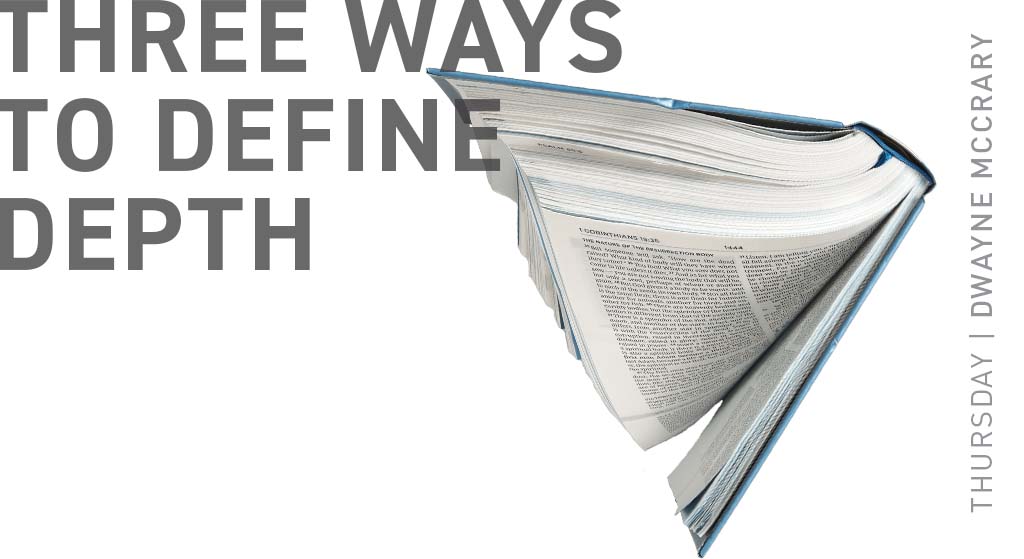Over the years, the Explore the Bible team has heard cries for depth in Bible study. Some of these cries are spoken in general terms at first, with the person simply stating a desire for more. Most express a genuine desire to grow in their faith but are simply not sure how to do that. When we probe for specifics about what is desired, we tend to find three main ideas expressed with each carrying a different focus. Those three categories are more facts, more reflection, and more action. Let’s look at these and how they may be expressed.
More Facts: This group will express this in different ways. Here are some examples: I wish we knew how far it is from Bethlehem to Jerusalem, I wonder why the word translated servant in one passage is translated a different way in another passage, I had hoped to find out the relationships between the kings of Judah and Israel during that time period.
To be sure, some of the desire to know a new fact is fueled by pride (I know something no one else knows) but most of it is driven by a desire to be a good student of the Bible. For example, knowing that Ezekiel and Daniel were contemporaries on two different sides of the same experience helps us get a clearer picture of the exile.
More Reflection: This group sees depth in terms of spending time reflecting on the emotions and values expressed in a passage. Here are some examples of what we may hear from this group: I love it when we consider modern day examples that parallel a Bible passage and how the experiences compare, I need time to process the why behind what I find in the Bible, I want to be challenged to think in a fresh way about a Bible story.
The value here is identifying with the people in the story or to whom a letter was written. They want to examine how their values stack up against the values of David as he faced Goliath. They want to place themselves in the story, looking for ways they act like Mary or Martha. They want to feel the impact of Paul’s letter to Philemon being read the very first time. The emphasis here is feeling the emotions and understanding the values that led to the actions discovered.
More Action: This group tends to focus on the what-do-I-do-now aspects of Bible study. Here are some examples of what this person might say: I know we are supposed to forgive people, but tell me how I do that with a person who hurt me, I wish we spent more time planning a course of action than looking at a map, I had hoped we would do more than just think about how we felt about a Bible story.
This group wants action. Think about the number of times we attended a Bible study, conference, or worship service, and we were not called to take an action. Granted, the purpose of that conference may have been to share information, but we should be expected to do something with that information.
Of interest is that the three groups reflect the three educational learning domains: cognitive (knowledge), affective (beliefs and values), and psychomotor (action). For depth to take place, all three are needed. When we read the Bible, we ought to look for the facts and try to discover something we didn’t already know. We should also go beyond the facts and consider our emotions and values in light of what we discover in the Bible. We need to take action.
So how does this work? In the normal course of a day, we encounter pieces of information that require a response. This may happen in a variety of ways: formal or informal, planned or spontaneous. We must interact with that encountered information in light of what we already understand and have been willing to accept, regardless of how limited or incomplete our understanding may be. We must gain a clear understanding of the encountered information and then reflect upon it in light of what we already accept as true. This reflection is not done in a void, but is influenced by experiences, personal truth filters, and a willingness to change (this may mean a reinterpretation of past experiences which may be painful so we choose to ignore a truth rather than risk reopening a wound we closed long ago).
At some point, we must decide what to do with the presented information. We can do nothing (affirming what we already believe and value), reject it (based upon our truth filters, which is also a personal affirmation of what we already believe), add it to our values (as a new fact set that had yet to be discovered), or adjust what we had understood (a different shade of that which had been perceived as true prior to the process). We then carry a new set of beliefs and values upon which we will act and react (transformation).
For us, depth is found in putting all the pieces together so that we live transformed lives. That requires us to interact with information, reflect on values and beliefs, and take action based on those values and beliefs.
Want to find out how Explore the Bible can help your groups dig deeper into the Bible and discover what it really says? Request a sample.
